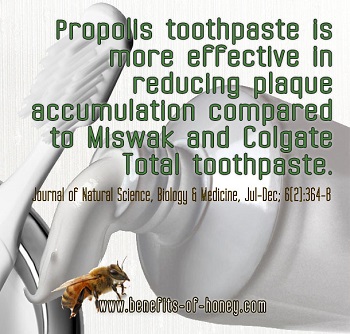propolis toothpaste
Propolis Toothpaste – Nature’s Wonderful Answer to Oral Diseases
Do you know that some toothpastes contain natural ingredients related to honey bees?

Propolis, also commonly known as “bee glue”, a sticky substance made by the honeybees from resins from trees and conifers. It is used by the honeybees as a “putty” to seal cracks and openings in the hive and to strengthen and repair their honeycombs.
Amazingly, because this sticky glue has a highly potent antibacterial, antifungal activity, honeybees also make use of it to embalm or “mummify” the carcasses of larger insects that invade the hive. Such intruders are immediately stung to death but because the defending bees can’t transport such heavy corpse away from the hive, they embalm them rather than allowing them to decay. The ancient Egyptians observed this and used propolis as one of the embalming agents for their exquisite mummies!
Our mouth is where the synesthesia of senses starts and the food we visualize develops its full smell and taste. It is the starting point of the food digestion. A healthy mouth cavity is certainly one of the elements contributing to the appetite and good mood in general. Sore spots, thrush or gum disease developed in the mouth can cause much pain and tormenting feeling.
With more and more published clinical studies demonstrating that propolis fights bacteria, prevents tooth decay, heals bleeding gums, and prevents gums from receding and bad breath, natural toothpastes containing propolis have become a popular, healthy alternative to synthetic brands of toothpastes, especially when mouth and gum disorders are concerned.
Results of a study done on patients diagnosed with chronic periodontitis and published by the Journal of Clinical and Diagnostic Research, September, 2015, revealed that propolis showed a statistically significant reduction in plaque. Other clinical studies on antiplaque efficacy of toothpastes found the following:
“Propolis was found to be safe and effective in reducing plaque accumulation when compared to Miswak and Colgate total toothpaste.”
~ Journal of Natural Science, Biology and Medicine. 2015 Jul-Dec;6(2):364-8 ~
“Propolis exerted an antibacterial action in vitro and in vivo, exhibiting a positive action in the control of dental plaque.”
~ Natural Product Research. 2017 Jun 23:1-5 ~
Manufacturers of propolis toothpastes claim that their products leave teeth clean, gums feeling healthy, taste great without artificial ingredients, and produce no negative side effects. It’s often explained that such toothpastes are suitable for young children’s use as even if it’s accidentally swallowed, it’s extremely safe.
Propolis extract now even comes in the form of sprays which are claimed to be effective against flu, cuts, burns, gum and mouth infections, throat infections and intestinal discomfort. There are also propolis candies that are sold as a good therapeutic substitute to the traditional throat lozenges and an aid to curing flu, colds, throat discomfort, cough and bad breath. These products are easily applied or consumed, and have increasingly become part of the everyday dental hygiene of people who are especially interested in natural remedies.
Other Related Pages on Propolis Toothpaste
1. Honey as a gum disease remedy may sound ridiculous to you, but not if you know what’s actually in honey! Details in: Natural Gum Disease Remedy – Honey
2. All about propolis: The Natural Antibiotic.
3. For propolis products such as propolis capsules and candies, check out Bee Healthy.